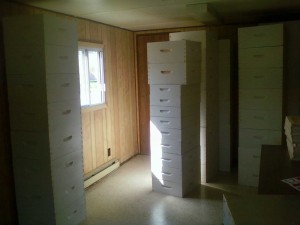Congrats to Brock for successfully defending his masters’ thesis today. Brock’s thesis was awarded with distinction (top 5%) and contained one published paper and one manuscript that is about to be submitted. Brock was very productive; he completed one published side project and several other experiments that will be written up this fall/winter.
All you bee fans out there – don’t despair! Brock is continuing his research in the lab as a PhD candidate this September.
Congrats Brock!
I am happy to announce that we are hosting York’s latest spark student here at the lab. Spark is an award of up to $4000 allowing superstar high school students to participate in ground-breaking research at York University.
Amon will be joining our research group as we tackle studies of honey bee immunity and genomics.
Welcome Amon!
Check out Amon’s blog to learn more about his experiences in the honey bee lab!
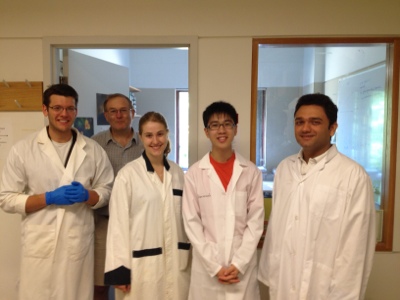
(left to right: Brock, Clement, Nadia, Amon, Afshin)
The spring is starting to break in Southern Ontario, just in time to greet the new cohort of summer students joining the lab, including:
Nadia Tsvetkov, our new research associate (and incoming MSc Student this fall)
Jack Xu and Mohammad Mahjoori are summer NSERC undergraduate scholarship students (congrats! its very competitive)
Anna Chernyshova, Arash Soltani and Tabashir Chowdhury are honours thesis students (Anna and Arash are also Research at York students this term)
and Armando Ponte who is doing a summer research practicum.
Stay tuned for updates on our summer research;
Sincerely,
Amro
I’ve been having fun reading/using two recent bee books: Laurence Packer’s Keeping the Bees and May Berenbaum ‘s Honey, I’m Homemade
Laurence is a former-mentor and now colleague at York University’ Department of Biology – the book is very informative and fun to read. I am a bit biased however, as I like to think that I am the hero of chapter 8 !
May’s book is a great compilation of desserts using honey as an ingredient (I’ve been salivating over the Norwegian Rice Custard recipe on page 113)… Remember to buy honey from your local beekeeper before trying out the recipes!
The honey bee as a model organism has many advantages (haplodiploidy, high recombination rate, huge family sizes, well known ecology and physiology, etc.). A subtle and understated advantage is unlike other lab critters, you don’t have to feed them… as a matter of fact, the bees feed you! Here are a few pictures of our honey harvest from a couple of weekends ago. A very rewarding experience after a long and warm field season!
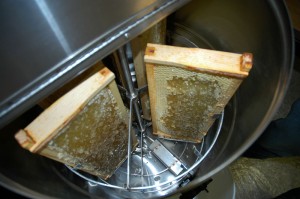
Our first spin!
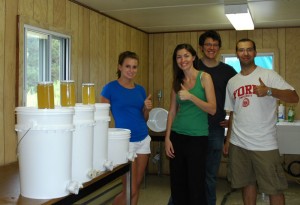
(L->R: Alex, Jen, Brock, Amro)
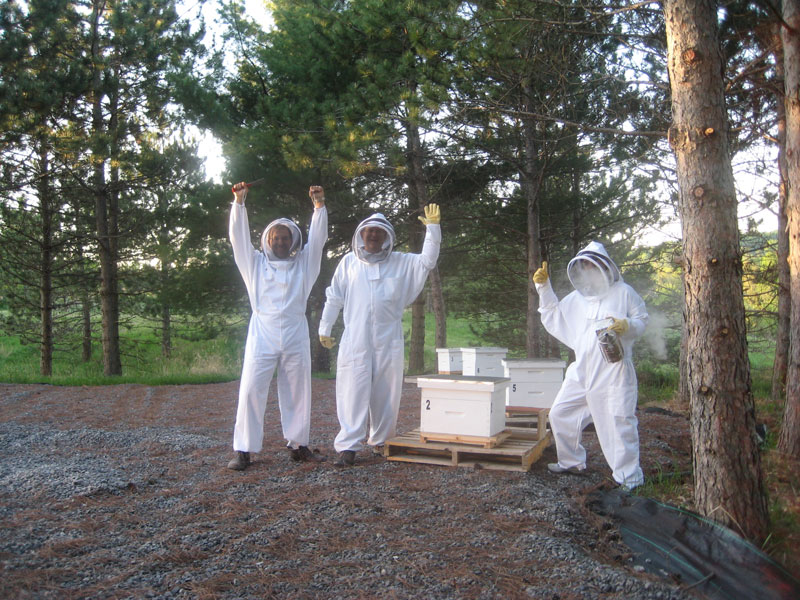 I spent the day driving royalty across the province! Clement and I picked up nucleus colonies nearby London, Ontario, and drove them back to our Research Apiary north of Toronto. Clement, Jen and I then spent a few hours moving the bees into our hives and making sure they were well fed. The queens, workers and drones made it safely and are happy in their new home. This officially starts the first bee season for the Zayed lab 🙂 Long live the queen!
I spent the day driving royalty across the province! Clement and I picked up nucleus colonies nearby London, Ontario, and drove them back to our Research Apiary north of Toronto. Clement, Jen and I then spent a few hours moving the bees into our hives and making sure they were well fed. The queens, workers and drones made it safely and are happy in their new home. This officially starts the first bee season for the Zayed lab 🙂 Long live the queen!
Ask not what your bees can do for your lawn, but what your lawn can do for your bees?
Pollinator gardens are a great way to create habitat and provide food for bees, butterflies and birds. With the help of fellow lab member and Supreme Gardener, Clement Kent, I am transforming my boring grass front yard to a native pollinator garden. Grass had it coming – it just sits there and does nothing, all the while consuming precious water and eating up fertilizers; don’t even get me started on the constant mowing!…
Clement, our green crusader, has setup a great blog to mark his quest in transforming Toronto’s lawns to beautiful pollinator gardens, check it out at http://pollinatorgardens.blogspot.com/
Amro
Our lab’s 2010 summer cohort of Research at York (RAY) students are:
Alexandra Bunting, Amer Issa, and Mandana Aryaee ; congrats!
The bees are coming… look bee-zy 🙂
